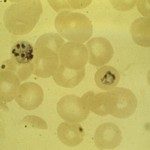Link to Pubmed [PMID] – 6760289
Reprod Nutr Dev (1980) 1981 ; 21(2): 247-55
For a number of years our group has been mainly interested in the regulation of muscle gene expression during myogenesis. Using primary cultures and cell lines we have tried to find out whether the coding sequences for muscle proteins are already present in an unexpressed form or if there is a transcriptional switch at the onset of differentiation. Metabolic studies on pulse-labelled RNA, together with translation and molecular hybridization experiments have given a certain number of indications. More recently the development of genetic engineering techniques has made it possible to answer these questions directly with probes which are complementary to specific muscle coding sequences. We have identified a plasmid which contains a coding sequence for muscle actin. Other recombinant plasmids are being characterized. Such plasmids, used as probes, will permit us to study the organization and expression of the genes coding for the contractile proteins in muscle cells.

